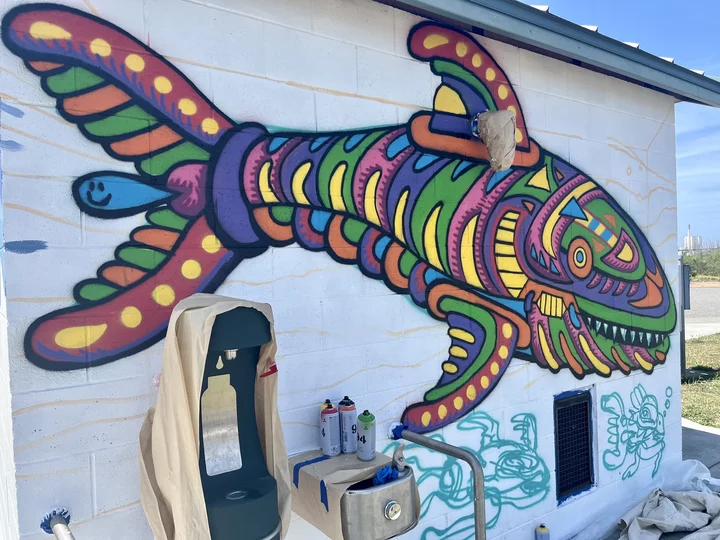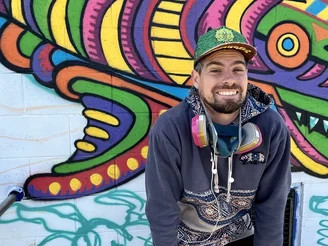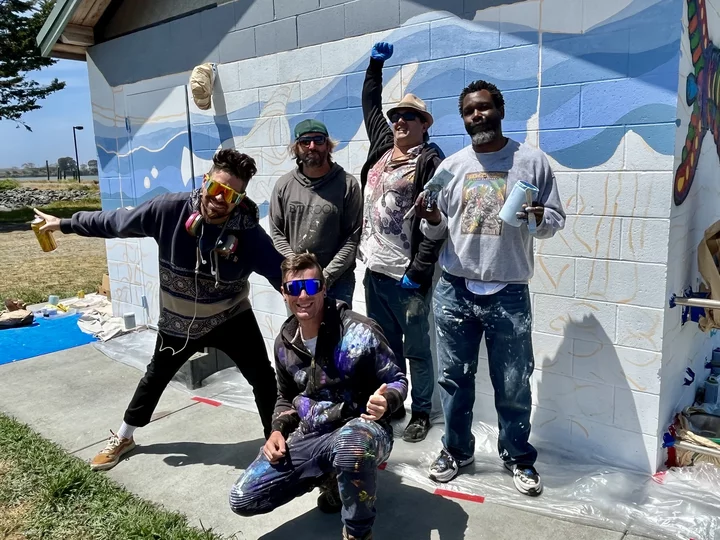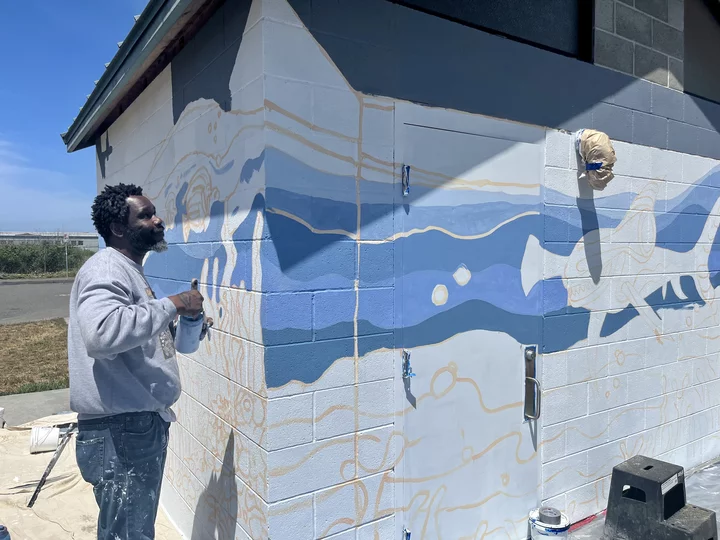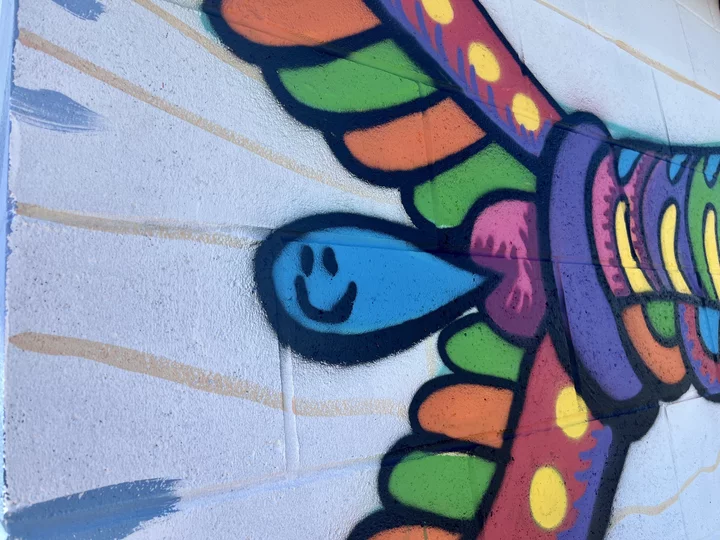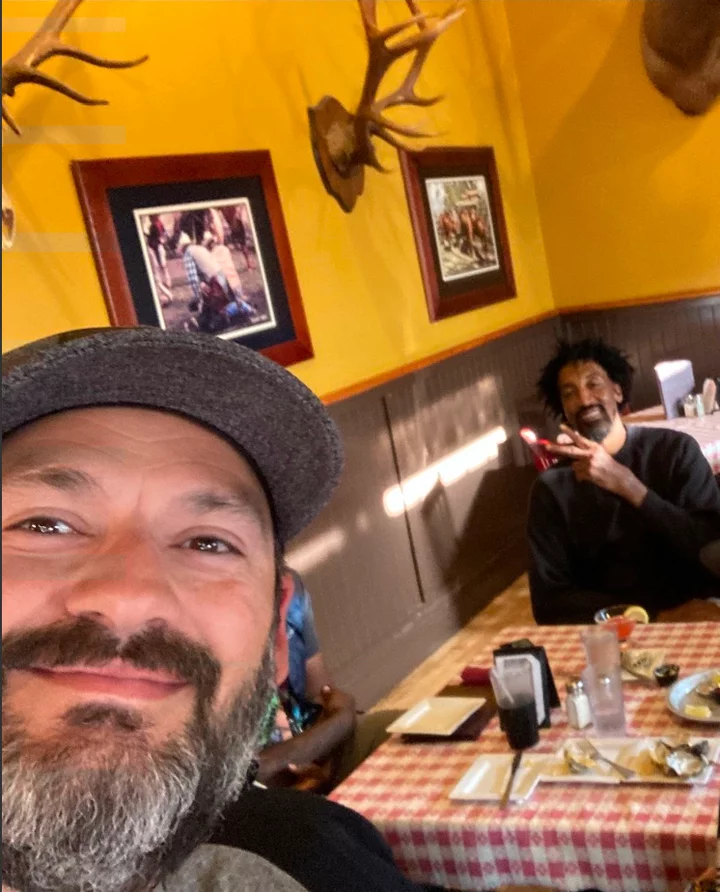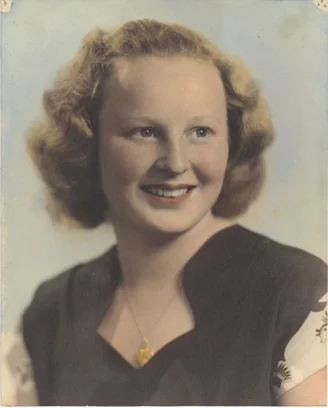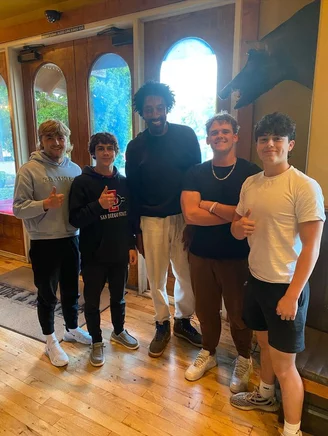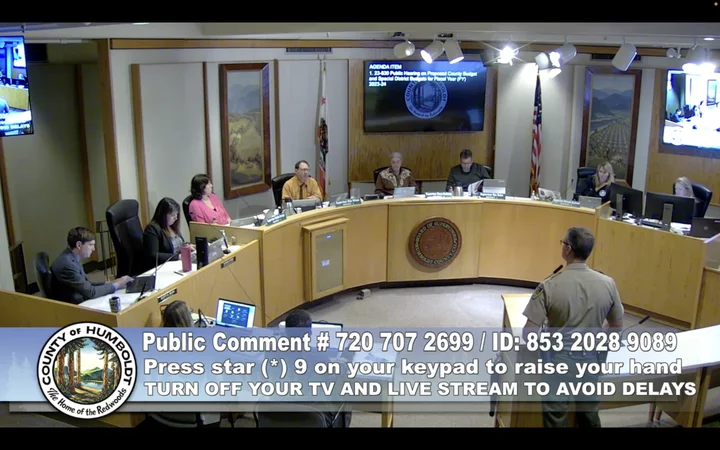(PHOTOS) Eureka Has Been ‘Fish Bombed!’ A New Mural is Going Up at Eureka’s Del Norte Pier Park, With Help From World Renowned Artist Chris Dyer
Stephanie McGeary / Thursday, June 15, 2023 @ 11:24 a.m. / Art , Eureka Rising
The “interdimensional robotic shark” by Chris Dyer as part of the “Sprirtual Shark Tank” mural in Eureka | Photos: Stephanie McGeary
###
Look out, Eureka! The Del Norte Street Pier Park, commonly known as “Shark Park,” just got a lot sharkier, with a group of artists – including Peruvian-Canadian artist Chris Dyer – painting a colorful mural on the bathroom near the playground.
The project, titled the “Spiritual Shark Tank,” was organized by local muralist Ben Goulart, who offered to do a free mural for the City of Eureka. Staff from the City’s community development department worked with Goulart and identified the bathroom building at Del Norte Pier Park as a place that needed a little makeover. He decided that a shark-themed mural would be the perfect fit.
So a few days ago Goulart and his apprentices Mariqus Eurgene Ludd and Scott Robertson got to work, pressure washing the building and then adding two coats of primer. On Wednesday the team began painting the mural and was joined by Dyer, who was covering one of the walls with a shark-like creature in his own psychedelic style, and local artist Blake Reagan, who was also adding his work to a section of the mural.
A big fan of Dyer’s art, Goulart saw on social media that Dyer was going to be in Humboldt to teach a painting workshop at a healing retreat in Willow Creek and hit him up to see if he wanted to work on a mural while he was in town. Dyer said he was happy to take the job and was excited to be asked to paint an aquatic creature, which is a subject he often features in his art.
“[Goulart] just told me that we were painting at this spot called the ‘Shark Park’ and we’re painting sharks,” Dyer told the Outpost as he was spray painting the wall on Wednesday. “And I was like ‘sweet. I’m a Pisces, I like to paint fish, I can paint my own version of a shark’…I’ve never painted a shark, but I guess it’s technically a kind of fish.”
Dyer has been a professional artist for nearly 20 years and has painted canvases, skateboard decks and walls all over the world. His work is featured in many museums, including the Bob Marley Museum in Jamaica and the Street Art Museum in Amsterdam, and he has been written about in Thrasher and High Times magazines.
One of his signature street art styles is what he calls “fish bombing,” where he paints stylized fish on a wall or object in different cities that he visits. Dyer could only commit to one day of work and was finishing his creation on Wednesday, but Goulart said that the other three artists will be painting for another few days, covering all four sides of the building with the trippy aquatic scene. After the painting is complete, the whole thing will be covered with sealant, to protect the mural from weather and graffiti.
Though Dyer has spent some time in Humboldt before (he has designed clothes and done brand management for Satori Movement and has attended Reggae on the River), this project is Dyer’s first permanent mural in Humboldt, and he was happy to contribute his creature – which he referred to as an “interdimensional robotic shark” – to the area.
“I’m happy to see empty walls turning into art-ified walls,” Dyer said. “That’s always a positive thing for everybody…I’m happy about leaving more of my personal expression for Humboldt, which is a place that I’ve always enjoyed.”
The whole team — Chris Dyer, Scott Robertson, Ben Goulart, Mariqus Eurgene Ludd and Blake Reagan
Ludd paints a section of the shark tank
Shark fart?
BOOKED
Today: 7 felonies, 7 misdemeanors, 0 infractions
JUDGED
Humboldt County Superior Court Calendar: Today
CHP REPORTS
Bates Rd / Hawks View Ct (HM office): Animal Hazard
Rowdy Creek Rd / Us101 (HM office): Hit and Run No Injuries
ELSEWHERE
KINS’s Talk Shop: Talkshop February 10th, 2026 – Yana Valechovic
County of Humboldt Meetings: Jan. 28, 2026 - Humboldt Housing and Homelessness Coalition Executive Committee meeting
County of Humboldt Meetings: Feb. 11, 2026 - Humboldt Housing and Homelessness Coalition Executive Committee meeting
The Guardian: Irish man with valid US work permit held in ICE detention for five months
THE PIPPEN FILES: Uh, So, Was That Scottie Pippen At Shamus T. Bones Last Night or Was It Not?
Hank Sims / Thursday, June 15, 2023 @ 10:06 a.m. / Celebrity
We think it was. Left. Submitted. Right: Scottie Pippen’s Facebook page.
Well, the last couple of hours have been quite a roller coaster ride.
I woke up to comments assuring me that the photo we published last night, of Chicago Bulls legend Scottie Pippen enjoying a meal at Shamus T. Bones a few hours earlier, was not in fact Scottie Pippen at all.
This despite the fact that the man in the picture looks quite a lot like Scottie Pippen.
Then I discovered that the kid who sent me the photo has a YouTube channel in which he and his pals pull pranks and stunts. Some of those same pals were in the picture with the purported Pippen.
At that point, I updated last night’s post to indicate that I now harbored a strong suspicion that I had been pranked, and perhaps this was not Scottie Pippen at all.
However.
Afterward, people started reaching out to us to say that they, too, spotted Scottie at the Shamus T. Bones, and they too had pictures.
For instance: Fellow kid @s.1grammer told us “It is him,” and sent his own picture, which, as he said, is a lot clearer.
Photo: @s.1grammer.
“Picture is more clear it’s him,” this kid says. “Voice is exactly the same as interviews I’ve heard. This picture is more clear and you can see him better it’s him %100.”
Here is Michael Acevedo getting his selfie. Acevedo, you will note, is not a teenage prankster but a grown-ass man, and he used email to contact us, exactly as an adult would do.
Photo: Michael Acevedo.
Asked to describe his interaction, Acevedo said:
I just asked if it was cool to get a pic with him… I saw others go over for a closer pic with him but I didn’t want to be overly intrusive. He was getting a lot of sneak pics and attention for sure. Basically had a crew with him…
Shortly after this, our original tipster, Cayden Woods, reached out. This is the kid I described as “an absolute baller,” and that’s a statement I will stand by, whatever the facts turn out to be.
Cayden pleaded his case. Look at his Instagram stories, Cayden said. You can totally see it’s him! I wasn’t lying.
Summoning my best impersonation of a high-school principal, I confronted Cayden with the cold hard evidence of his YouTube prank channel. You are a known prankster! Don’t try to deny it! What do you have to say for yourself, young man?
What he said was this:
NOOO
THATS FROM LIKE 2 YEARS AGO
we stopped that awhile ago
OG3 for life tho🐐
I promised Cayden yet another update, which you are reading now, and proceeded to curse him to hell if he is lying to me. He responded
that’s fair 😭 but i swear it’s not a prank
###
Now, for reference purposes, here is a video of the verified real Scottie Pippen throwing shade on a former teammate just a couple of weeks ago:
“LeBron James is probably one of the greatest winners to ever play the game.” @ScottiePippen
— Gimme The Hot Sauce Podcast (@gimmehotsauce21) May 30, 2023
🚨FULL STORY HERE: https://t.co/cGIT8cCqsr pic.twitter.com/JIWJNYMqVq
And after having considered all of this, the Outpost believes that the preponderance of the evidence will show that, yes, in fact, the great Scottie Pippen himself was in fact in Eureka last night, and had dinner at Shamus T. Bones.
But we don’t trust ourselves anymore! Nothing makes sense! You have to tell us: Is that Scottie Pippen?
For the First Time, California’s Attorney General Has Fined Landlords Who Violated a New State Rent Control Laws
Ben Christopher / Thursday, June 15, 2023 @ 8:17 a.m. / Sacramento
In 2019, Gov. Gavin Newsom signed a law to shield California renters from double-digit rent hikes and arbitrary evictions.
Nearly four years later, the state announced its first enforcement action against a landlord under the California rent control law.
Attorney General Rob Bonta today announced that San Jose-based developer and property manager Green Valley Corporation will be on the hook for hiking the rent on 20 Silicon Valley tenants by an average of 151% — far in excess of the cap set by the law. The settlement also states that the company unlawfully evicted six tenants without providing a “just cause,” another violation.
“When the Legislature writes a law and the governor signs it, it’s the law, it’s not a suggestion, it’s not a recommendation, it’s not a ‘if you want to,’” said Bonta.
The attorney general noted that this was a first for his office. “But it won’t be the last,” he said
Under the terms of a settlement filed in Santa Clara County Superior Court, Green Valley, which also does business under the name Swenson Builders, will be forced to pay $391,130. Of that, $331,130 will be refunded to tenants in overpaid back-rent.
“This is a strong reminder that the California Tenant Protection Act is the law of California and that law will be enforced,” said San Francisco City Attorney David Chiu, who authored the 2019 law when he was in the Assembly.
The settlement concludes a year-and-a-half long investigation by the Attorney General’s office.
As San Jose Spotlight reported last year, Swenson increased the rent on nearly two dozen tenants living near San Jose’s Japantown in 2021. Some of those tenants reached out to local legal aid organizations, which brought the issue to the state’s Department of Justice. The company reimbursed three tenants and admitted in a letter that the rent hikes were “higher than permitted by law.”
Tenant rights groups have decried the 2019 law as toothless ever since it took effect. Bonta’s announcement of the state’s first-ever enforcement action amounts to a very public flashing of fangs.
“It’s been really frustrating that the Legislature passed [the rent cap law] and then appeared completely unwilling to actually enforce it,” said Shanti Singh, a lobbyist and spokesperson for Tenants Together, a statewide renter advocacy organization. “The Legislature has been doing tenants very few to no favors right now, so Bonta is picking up their slack and we’re very appreciative of that.”
A rent cap in name only?
The 2019 law, introduced by Chiu and co-authored by then-Assemblymember Bonta, capped annual rent hikes to 5% (since increased to 7%) plus inflation.
The law also requires landlords to put forward a “just cause” before evicting a tenant without compensation. Justifiable reasons include not paying rent, breaching the terms of a lease agreement or engaging in criminal activity on the premises of the rental property.
State law has long limited cities from enacting their own rent regulation policies or expanding existing ones. When lawmakers agreed to implement a statewide cap in 2019, it was a historic break from a decades-long aversion to anything that even smelled of rent control.
Bu t the law didn’t specify who would actually hold scofflaw landlords to account. Instead, it was left up to tenants, often short on cash and without a lawyer on speed dial, to challenge violations in court. Housing researchers have been unable to figure out just how widely or thoroughly the law is actually followed or enforced, but renter advocates like Singh say violations are “rampant.”
10% rent hikes allowed under California rent control law
In recent years, the maximum allowable rent under the law has ballooned across California. When the law went into effect, inflation was below 2%, translating to a cap of around 7%. Since then inflation has soared. Over the last two years, landlords in certain parts of the state have been legally allowed to raise rates up to the law’s 10% ceiling.
Earlier this year, Los Angeles Democratic Sen. María Elena Durazo introduced a bill to bolster the 2019 rent cap law. Though an earlier version of the bill was watered down to remove language that would have lowered the rent cap to 5%, the bill still includes a provision setting financial damages for tenants who sue their landlords. It also explicitly empowers local and state prosecutors to sue on their behalf.
Durazo’s bill passed out of the Senate last month and is now awaiting consideration before the Assembly.
###
CalMatters.org is a nonprofit, nonpartisan media venture explaining California policies and politics.
Four Things California Can Do as Home Insurers Retreat
Grace Gedye / Thursday, June 15, 2023 @ 7:48 a.m. / Sacramento
After State Farm declared in late May that it wouldn’t sell any new home insurance policies in California, people shopping around for new insurance had one fewer option. When days later it was revealed that Allstate had quietly made the same decision last year, Californians are now left wondering: How bad is this? And how should the state respond?
The “crisis” in California’s insurance market was caused by “a laser focus only on affordability,” said Nancy Watkins, a principal at Milliman, an actuarial firm, at a legislative hearing on Wednesday. The companies are operating with “very crude tools” at the expense of availability and reliability, she said.
She said the current regulatory system is too rigid. “It’s like you’ve got your steering wheel locked straight ahead, you’ve got your speed set on cruise control, and now you find yourself on the Pacific Coast Highway,” she said. “What insurance company would agree to that?”
Home insurance premiums in California are a little cheaper than the national average — and much lower than premiums in other disaster-prone states like Florida and Louisiana. That’s without accounting for the fact that California has some of the most expensive housing in the country.
California still has about 115 companies offering home insurance, said Michael Soller, a deputy commissioner for the state’s insurance department. As for whether more companies are likely to follow State Farm and Allstate, “we don’t think that will happen,” he said.
Consumer and insurance industry groups and other experts have ideas for what they’d like to see California do in the wake of the news — few of which they agree upon. Here’s the debate over four of those ideas.
Require State Farm to keep issuing new policies
There’s disagreement whether this idea, backed by the group Consumer Watchdog, is legal.
The idea hinges on how insurance prices are regulated in California. Under current laws, insurance companies can’t just charge whatever they want: They have to submit their proposed rates to the insurance department, which they back up by explaining their projected costs, losses, revenue and more. State regulators can approve a company’s proposed rates, or deny them, if they think, for example, the rates are unjustifiably high, or so low that they could put the company’s finances at risk.
Harvey Rosenfield, founder of Consumer Watchdog, said if a company suddenly says that it’s not going to take the same number of customers that it had projected when it got the department’s approval, then it has changed the assumptions on which the approval was based.
“They granted themselves a de facto rate increase by reducing the risk” in a state where that’s illegal, said Rosenfield. The department could issue a notice to State Farm, he said, and tell the company it needs to keep selling new home insurance policies until it submits new rates and those rates are approved.
The insurance department disputes that it has the power to do this. “Their claims are not supported by law,” said Soller, the deputy commissioner. “There’s a reason why it hasn’t been done by any insurance commissioner before.”
Let insurance companies use forward-looking catastrophe models
The kinds of data and statistical models insurance companies can use to set prices may sound like a nighttime sleep aid, but it’s a matter of lively discussion in insurance circles.
When a company tries to justify rate changes, it is required to rely on past losses to project future losses. It can’t use factors like the locations of new homes it is covering — whether they’re in downtown San Francisco or rural wine country — or the increased risk of wildfires due to climate change.
“We do it in a very old-fashioned way, and it needs to be updated,” said Rex Frazier, president of the Personal Insurance Federation of California, an insurance industry group that counts State Farm as a member. He supports the use of forward-looking models, which are generally provided by other private companies. California already permits insurers to use models for earthquake insurance.
If a company is trying to figure out how much it should charge for earthquake coverage, it would look at proximity to fault lines, Frazier said, but for wildfire insurance, California doesn’t do that.
“For wildfire it just says ‘Well, looking backward, what have you paid over the last 20 years for wildfire clients?’” he said.
Consumer groups generally oppose letting insurance companies use models, fearing that companies will use them to justify extreme price hikes, and that complex math will make scrutiny a challenge.
“They’re just very sophisticated crystal balls,” said Amy Bach, executive director for United Policyholders, a consumer group. Modeling companies generally see their models as intellectual property, which can pose a challenge for transparency. “Our fear is that they overstate risk,” said Bach.
About a week and a half after State Farm’s announcement, the insurance department said it would host a public workshop on use of models in insurance pricing, ahead of considering regulations. The workshop will take place on July 13.
On Wednesday, the Assembly’s insurance committee held a hearing on models. When asked by a legislator whether the department was moving toward incorporating catastrophe models, a department representative confirmed that it was.
“Historic losses do not fully account for growing wildfire risks, or risk mitigation measures taken by communities,” said Michael Peterson, a deputy commissioner at the insurance department, during the hearing.
Address the increasing cost of insurance — for insurance companies
Insurance companies are just like us: They buy insurance! When insurance companies buy it, it’s called “reinsurance.”
The cost of reinsurance has risen dramatically, and State Farm cited “a challenging reinsurance market” as one of the reasons it decided to stop selling new home insurance policies in California.
When insurance companies explain their costs to the insurance department as part of the process for justifying their prices, they aren’t allowed to include the cost of reinsurance. The department hasn’t historically permitted it, Soller said, because it doesn’t regulate reinsurance.
“What are insurers supposed to do when, on the one hand, the Department of Insurance is telling them ‘maintain your solvency’ and then, on the other hand, when their costs go up, you can’t charge for it,” said Frazier.
Insurance industry groups say it would help if they could incorporate the cost of reinsurance into their prices. But consumer groups say that the move would cause premiums to spike.
“Californians would see immediate massive rate hikes — both as soon as that went into effect and ongoing,” said Carmen Balber executive director of Consumer Watchdog. A reinsurance provider regulated by California would address problems she sees with the reinsurance market, Balber said, but that doesn’t exist currently.
Reduce the risk of disasters
The underlying problem is that disasters happen in California — at an increasing rate thanks to climate change — and that homes are at risk. They’re in the middle of the woods, or surrounded by flammable grasslands, or on the edge of bluffs that are expected to erode. Making homes less likely to burn, flood or collapse would be good for homeowners and would also make California feel less risky to insurers.
There’s no shortage of ideas for how to reduce risk, and there’s been action on this front in recent years. The insurance department, for example, has required insurance companies to consider whether homeowners take certain steps to protect their homes — like installing fire-resistant vents and clearing out vegetation under decks — in their prices.
California has set aside $2.7 billion for wildfire resilience over the past three years, according to the insurance department. When the department convened a group of environmental advocates, researchers, and public policy and insurance experts to make recommendations on how to reduce the risks of climate change, they came up with a long list. Among the recommendations:
- Create statewide hazard maps so that future risks are more clear to the public
- Increase funding to retrofit homes
- And apply fire-resistant building codes in areas with moderate to higher fire risk.
Cutting greenhouse gas emissions would ultimately be the best way to reduce the risk, said Alice Hill, chair of the group convened by the department and a senior fellow for energy and the environment at the Council on Foreign Relations. But the world will get warmer even if we reduce emissions, she said, so focusing on where and how homes are built remains important.
“That could mean not building in areas that are just becoming too risky,” Hill said.
###
CalMatters.org is a nonprofit, nonpartisan media venture explaining California policies and politics.
OBITUARY: Annie Mae Wentworth, 1930-2023
LoCO Staff / Thursday, June 15, 2023 @ 7:01 a.m. / Obits
Annie
Mae Wentworth returned home on June 5, 2023 to be with her father,
William (Bill) Nielsen; mother, Signe Rising Nielsen; brother, Robert
and sister, Lily Victorine.
Annie was born on March 31, 1930 in Grizzly Bluff (Ferndale). She was the third child of Bill and Signe and was later joined by her sister, Betty. In 1938 the family moved to Loleta, where she spent all her growing up years working hard on the ranch and playing with her sisters and brother. They were all active in 4H growing up and enjoyed the friendships made there. She graduated from Fortuna High in 1948 and then moved to Sacramento to work for the State. It was there she met her husband, Herbert Wentworth. They were married in a double wedding with her sister Betty on January 14, 1951 in Ferndale.
Annie and Herbert had three sons; Michael, Richard and John. They lived in various places in Humboldt County before eventually settling in Ukiah for many years. When the marriage ended, Annie and the boys moved back to Fortuna where she lived for the last 50 plus years of her life.
Annie was active in the Danish (Valhalla) and Swedish Lodge and was proud to be a lifelong member. She loved Bingo, Gardening and being with her sisters and family. She loved family get-togethers.
Annie is survived by her sister, Betty Harper, and her three sons; Michael, Richard (Rick) and John (Diane Letner). Three Grandchildren; Michael, Kirsten, and Justin (Rachelle) and six great-grandchildren. Many nieces and nephews who have fond memories of visiting with her. We love you Annie.
Funeral services will be held Monday, June 19 at 1 p.m. at Ocean View Chapel under the care of Gobles Mortuary, Fortuna.
###
The obituary above was submitted on behalf of Annie Wentworth’s loved ones. The Lost Coast Outpost runs obituaries of Humboldt County residents at no charge. See guidelines here. Email news@lostcoastoutpost.com.
(UPDATE: UMM….) A Bunch of Local Ballers Ran Into Scottie Pippen at Shamus T. Bones Tonight (Or Not)
Hank Sims / Wednesday, June 14, 2023 @ 9:26 p.m. / Celebrity
SECOND UPDATE:
###
UPDATE, JUNE 15: Upon further reflection this morning, we regret to say that we now entertain very serious doubts that this is Scottie Pippen, though he does look quite like, and we must admit that there is a strong chance that we were successfully pranked.
###
A gaggle of absolute ballers from Eureka decided to go hit up Shamus T. Bones for dinner tonight.
Lo and behold, what did they find?
Not only their dinner, which would not have been particularly surprising, and not worth a post on the Lost Coast Outpost. Though the dinner is good.
What was surprising was what they found as they entered. That was: Six-time NBA champion and Basketball Hall Of Famer Scottie Pippen, who seems to have been passing through Eureka tonight.
We will let baller Cayden Woods — that’s @simply_caden_ on Instagram, where you should follow him immediately — tell the story:
me n my homies went to shamus for dinner, n while we were walking in he was kinda rushing out w his fam, so he j stppped for a quick flic n left, he shook our hands tho n was super chill when we asked him
What in the world could Scottie Pippen be doing in Eureka right now? We don’t have his cell phone number, so we could not ask. Also, there is no immediate evidence on Pippen’s socials of a Pippen sojourn to Redwood Country, nor any indication of why he might be in town.
But in any case: Welcome, Champ! The redwoods are nice and you should certainly take your family to visit them. I also recommend the pickup scene at Hammond Park, at 14th and F, where you will be recognized and celebrated as the god you are. Shame the kids are still in school, though.
Facing a $17.7M Deficit, County Supervisors Make Recommendations for Next Year’s Budget and Disperse Dwindling Unclaimed Measure Z Revenues
Ryan Burns / Wednesday, June 14, 2023 @ 4:37 p.m. / Local Government
The Humboldt County Board of Supervisors at Monday’s budget hearing as Sheriff Billy Honsal speaks at the lectern. | Screenshot.
###
The Humboldt County Board of Supervisors on Monday deliberated over some tough spending decisions as they considered the budget for the upcoming fiscal year and a dwindling pot of discretionary money to disperse from Measure Z, the county’s half-percent sales tax intended to maintain and enhance public safety and essential services.
Facing a $17.7 million deficit for the 2023-24 fiscal year, the board was presented with a number of potential cost-saving measures.
One option, previously used in 2011 during another budgetary shortfall, would be to launch an incentive program offering severance payments to employees who voluntarily resign. This Voluntary Separation Incentive Program (VSIP) would offer a $20,000 payment to eligible employees who have been with the county for 10 years or longer and who retire within the first month of the program. All other employees would receive $15,000 if they resign in that first month, with declining amounts offered over the following six months — first come, first served.
When this approach was employed a dozen years ago, 24 employees took advantage of the program. The county paid $233,000 in incentives but wound up saving roughly $5 million in salary costs and $3 million in General Fund expenditures over the next three years, according to a staff report.
Another option would be for the county to eliminate positions that have been vacant and/or unfunded for at least two years.
A third option, which is being researched by staff but not yet recommended or presented for implementation, would involve mandatory employee furloughs of various lengths — one or two days per month or a full week off between the Christmas and New Year’s holidays. Cost savings from this approach would range from $900,000 (for the unpaid holiday week) up to $5.4 million if employees were made to take two furlough days per month.
Back on May 22, seeing the dark fiscal clouds on the horizon, the board implemented an immediate hiring freeze through the end of the 2023-24 fiscal year.
Screenshot from a presentation at Monday’s budget hearing.
The total spending plan for the upcoming fiscal year is $578.55 million, which represents an increase of $7.2 million from the current fiscal year’s budget. The board is scheduled to adopt the new budget at a hearing on June 27, and the current draft would require the county to dip its General Fund balance to cover the $17.7 million shortfall.
The county also spent time considering how to allocate $397,000 in as-yet-un-obligated funds from the federal American Rescue Plan Act (ARPA) and $880,000 in anticipated Transient Occupancy Tax revenues from Measure J, a hotel tax approved last year.
Early in the hearing, Second District Supervisor Michelle Bushnell lamented the lack of sacrifice from county departments and funding recipients during this difficult time.
“[W]e have to make tough decisions and everybody wants a piece of the [pie] and nobody seems to be willing to give,” she said. “And I don’t know where we’re gonna get the money — and especially when everybody says, ‘No, not me. Pass the buck.’ The buck’s gonna really fall short.”
With much of Measure Z revenues already spoken for via ongoing grants and employee costs, the board had only $1.12 million in discretionary funding available to allocate for the 2023-24 fiscal year. That figure jumped up to $1.2 million after the board voted to defund a vacant IT position in the District Attorney’s Office.
After much deliberation — including some grilling of applicants by supervisors who wanted to know how little they could receive and still meet their goals — the board voted unanimously to award $320,000 to K’ima:w Medical Center’s ambulance program, $120,000 to Southern Trinity Area Rescue (STAR) ambulance services (whose territory extends into Humboldt County) and $195,438 to the Humboldt County Drug Task Force, with a small the remainder — roughly $562,000 — going to the Humboldt County Fire Chiefs’ Association.
But the board also noted the need to rethink how Measure Z funds are allocated in the future.
Glenn Ziemer, member and former chair of the Humboldt County Citizens’ Advisory Committee on Measure Z Expenditures, emphasized the need for this. [Note: A previous version of this story incorrectly identified Ziemer as the current chair. The current chair is Ginger Campbell. The Outpost regrets the error.]
“I truly believe with all my heart that unless you take some decisive, definitive action this year, you will lose any ability to normalize Measure Z and bring it back to the community service that it has been over the last nine years … ,” he said. “The simple fact of the matter is the normal inflationary costs of your payroll schedule … will totally overrun the fund and it will cease being the community-based benefit process it has been historically and simply turn into another line in the county’s personnel ledger.”
Humboldt County Sheriff William Honsal defended his department’s large, ongoing claims on Measure Z revenues, saying that if those funds went away, his department would have to eliminate 35 deputy positions and pull back on specialized services, focusing only on “that basic level of service throughout the county of a 911 response.”
Honsal and Third District Supervisor Mike Wilson had a long discussion about whether and how the Sheriff’s Office might make do with less, if necessary. County staff and the board’s Measure Z ad hoc committee — comprised of Bushnell and Wilson — will continue deliberations on Measure Z spending in the coming weeks.
As for the budget, the board directed staff to use the $397,000 in ARPA funds to offset the “urgent additional funding request burden” on the General Fund next year. They also approved the staff’s recommended parameters for a voluntary separation program and directed staff to continue researching a mandatory furlough option.
Again, the budget is scheduled to be adopted at a hearing on June 27.

